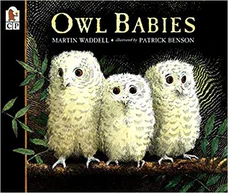Owl Babies

Publisher's Summary:
When three baby owls awake one night to find their mother gone, they can’t help but wonder where she is. Stunning illustrations capture the owls as they worry about their mother: What is she doing? When will she be back? Not surprisingly, a joyous flapping and dancing and bouncing greets her return, lending a celebratory tone to the ending of this comforting tale.

Dr. Annie's Takeaways
Recommended for: Many young children who are anticipating or experiencing a separation from a caregiver will love the emotional journey of this short, simple book and will benefit from the book’s conclusion– despite the owl’s worries and fears, Owl Mother always comes back. This book is probably best for a child whose parent is going to work or leaving for a short period of time, rather than a longer separation.
Would a child like it? Many children love this book. It’s emotional with a happy ending.
Evidence-Based Practices:
Exposure
Tone: Emotionally resonant, a bit dark but ultimately triumphant
Story Quality: This book is a classic, and it’s been a favorite of many young children for decades. It’s a very simple story about baby owls left alone in a nest while their mother is out hunting. But it reflects many of the big emotions that children feel when separated from a caregiver.
Illustrations: Beautiful, somewhat brooding illustrations of baby owls in their tree at night.
Representation: There are three baby owls–the oldest is a female owl, and the two younger owls are males. They have an Owl Mother who is out hunting and returns at the end of the story.
Psychological Practices: Owl Babies names and validates the often-quite-dark fears and feelings that a lot of children this age have when separated from a parent. It’s a bit scarier than a lot of books for children this age (the baby owls are alone and start to worry that their Owl Mother has gotten lost or eaten by a fox), so it allows children to practice the cycle of feeling afraid, tolerating this discomfort, and then experiencing the relief of reunification. Don’t be surprised if a child wants to read this book over and over again–many children benefit from experiencing this progression of feelings repeatedly until they have adjusted to a separation.
Concerns: None
